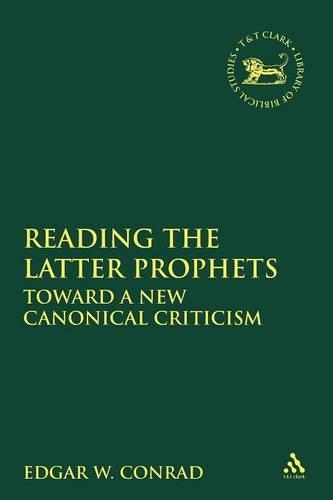
Reading the Latter Prophets: Toward a New Canonical Criticism
(Paperback)
Publishing Details
Reading the Latter Prophets: Toward a New Canonical Criticism
By (Author) Dr. Edgar W. Conrad
Bloomsbury Publishing PLC
T.& T.Clark Ltd
1st April 2004
United Kingdom
Classifications
Professional and Scholarly
Non Fiction
224.06
Physical Properties
Paperback
306
460g
Description
Edgar W. Conrad focuses on the prophetic books as composite collections and shows that (1) prophets are characters in the text, depicted as figures of the past whose words are significant for a later time; (2) reading and writing play a central role in the depiction of prophets; (3) prophetic books are presented as written words available to later generations through reading; (4) that read as a whole, the latter prophets depict the end of prophecy and the emergence of messengers of the Lord. Reading the Latter Prophets is an important contribution to the problems of both the formation and function of the prophetic literature.
Reviews
"Conrad's book is original and offers new insights on the prophets and the prophetic books....few interpreters of Scripture go so quickly and reflectively to the heart of a text as does F. If one wants to hear the word of Yhwh afresh in the study of Jeremiah, this commentary gives the reader a whole new set of ears for careful listening." -The Catholic Biblical Quarterly, 67, 2005
"Edgar Conrad offers us a detailed and thought-provoking study of links within and in between the books of the latter prophets. Dissatisfied with the traditional form critical studies of Gunkel, and the rhetorical stylings of Muilenburg's approach, he begins with a review of these well-known paths and argues that, in their own ways, these historical-critical models can in fact be understood as radical reader-response reconstruals of the given texts. Conrad offers instead a semiotic reading based on Eco's model of communication, whereby texts are read as literature which achieves communication via semiotic codes picked up by the readers...this is a rewarding discussion of the various texts, sure to illuminate many inter-textual links among the latter prophets." Richard S. Briggs, St John's College, Durham, Heythrop Journal
Author Bio
Edgar W. Conrad is Director of Postgraduate Studies in the School of History, Philosophy, Religion and Classics at the University of Queensland.
